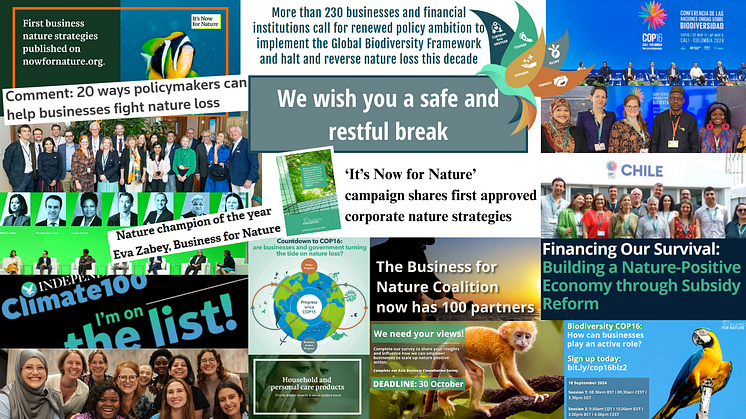
News -
Catch up on the main nature policy news from November
In a nutshell: COP29 outcome / Plastic Treaty talks / EUDR update / G20 Declaration
COP29 outcome
The UN climate summit concluded with mixed outcomes, particularly on climate finance. Delegates adopted the New Collective Quantified Goal (NCQG), revising the 2009 target. Developing nations urged wealthier countries to mobilize $1.3 trillion annually by 2035. However, the final agreement only requires developed countries to take the lead in raising $300 billion per year for developing nations by that deadline. A broader roadmap aims to mobilize $1.3 trillion annually from all sources, including the private sector.
During the negotiations, more than 100 organizations urged Parties to include ambitious commitments to finance nature within the NCQG text, but all mentions of nature and biodiversity were ultimately removed.
Progress was made on international carbon markets under Article 6 of the Paris Agreement, meaning all core elements of the Paris Agreement have now been finalized after ten years. COP29 finalized rules for country-to-country trading and established a new global carbon market under Article 6.4.
For more in-depth analysis from COP29, read this Carbon Brief article.
Plastic Treaty talks come to an end without a deal
Delegates gathered for the 5th Session of the Intergovernmental Negotiating Committee (INC) to develop a Global Plastics Treaty. Although it was expected that the INC-5 would deliver the final text of the instrument, negotiations stalled over disagreements on capping plastic production, phasing out and banning certain plastic products and chemicals, and financing the treaty.
“A small bloc of petrostates”, including Saudi Arabia, stalled progress and diluted ambition, by opposing the cap on production of plastic and instead pushing for a voluntary deal to focus on plastic waste. On the other hand, more than 100 countries, led by Panamá, proposed to create a path for a global plastic production reduction target. Negotiations will continue next year.
An ambitious Plastic Treaty across the full lifecycle of plastics has the potential to end or significantly reduce plastic pollution by aligning national policies and actions towards a global goal on plastic. For businesses and investors, this represents a level playing field and avoids disconnected action. Through the Business Coalition for a Global Plastics Treaty, leading businesses strongly support an ambitious treaty.
Provisional agreement on the EU Deforestation Regulation
The European Council and Parliament reached a provisional agreement to delay the implementation of the EU Deforestation Regulation (EUDR) by one year, without making any additional changes to the text. Large companies will be subjected to the EUDR from 30 December 2025, while SMEs will be expected to comply from 30 June 2026. The decision still must be formally endorsed by both institutions to enter into force.
The European Parliament had previously proposed adding a "no-risk" category to the country benchmarking system, but several Council members argued that reopening the text would create legal uncertainty and weaken due diligence requirements.
Several companies, including cocoa and rubber import businesses, and investment firms raised concerns regarding potential delays and/or amendments to the EUDR. They argued these would create an uneven playing field, contribute to confusion and undermine the EU’s commitment to reduce deforestation.
G20 Leaders’ Declaration
After the latest meeting of G20 in Rio de Janeiro, leaders presented the G20 Rio de Janeiro Leaders’ Declaration. The text covers: the international political and economic situation; social inclusion and the fight against hunger and poverty; sustainable development and climate action; reform of global governance institutions; and inclusion and effectiveness in the G20.
The Declaration shows consensus on limiting the increase in global average temperature to below 2ºC with respect to pre-industrial levels, as well as halting and reversing deforestation and forest degradation by 2030.
G20 leaders also called on countries to ratify the High Seas Treaty, which has been ratified by 15 countries to date, and expressed support for the Tropical Forests Forever Fund (TFFF) as a resource mobilization mechanism.
Read the September news update to catch up on previous nature policy stories from around the world.
Don’t forget to read our policy recommendations to governments that cover several topics outlined above.


